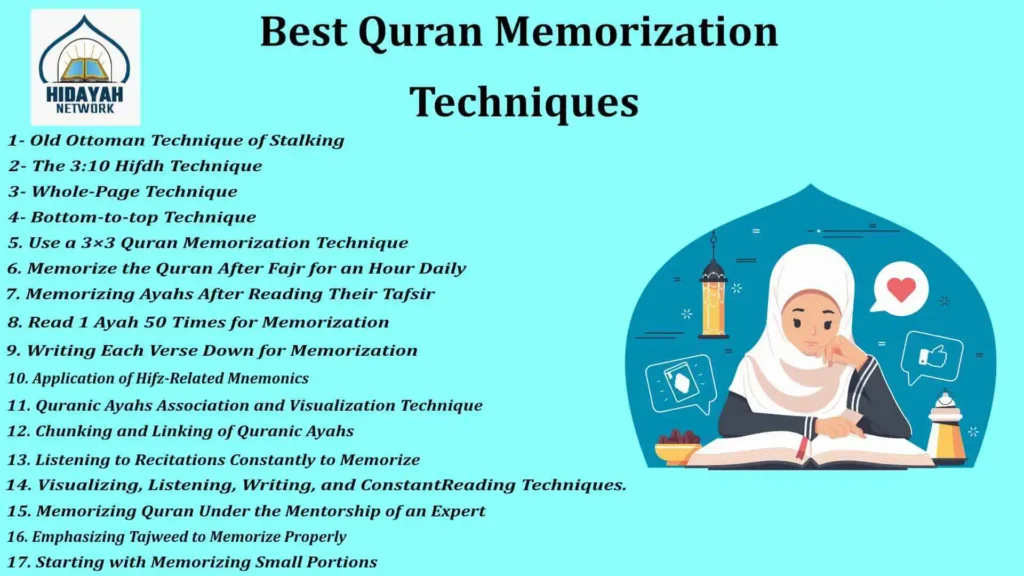People looking to memorize Quran try out various techniques but don’t know which one is the best for them. People who hifz Quran early or late, use different hifz techniques that suit their pace and capacity.
Some of the best techniques entail the old Ottoman way, memorizing the Quran after Fajr, memorizing ayahs after reading their Tafsir, reading 1 ayah 50 times, and more. As you can see there are multiple techniques, and choosing the best one for yourself isn’t easy. That’s why we encourage you to read about them in detail so that you know which one fits your glove the best.
Table of Contents
Toggle17 Best Techniques to Memorize the Quran
We at Hidayah Network have listed here some renowned Hifz techniques that are followed by instructors in online hifz program to achieve goals successfully.

1- Old Ottoman Technique of Stalking
Memorize quran in ottoman method is Quite unusual but known as the best hifz technique used by many Turkish tutors even to date. It is also called stalking, in which you pile up pages before they get stapled.
How It Works:
In the beginning, the student is supposed to learn the last Juz (30th-Amma). This juz is wholesome regarding Tajweed, short and long verses, short and long surahs, and easy and difficult words and phrases. So, after bringing the students into a proper hifz routine, the stalking starts
Firstly, you will memorize the last page of 1st Juz. Let’s say the standard copy of Mushaf you are using has 20 pages in each Juz. So you will begin learning the 20th page of 1st juz and go on learning the last pages of each juz until you reach the 29th.
Then, you will start learning the 19th (the second last) page of each juz (1-29). Then, the 18th page of all, and keep doing so until you are done with all the pages.
Get 40% OFF Now!
2- The 3:10 Hifdh Technique
3:10 Hifdh Technique is another good method that is considered result-oriented. It is used by many tutors from different countries and students have successfully finished the Quran through it.
How It Works:
You have to open the page that you intend to memorize and start with the 1st line. Read it 10 times by looking at the Mushaf to get it perfect on your tongue. Then, read it 3 times out of your memory. If it is correct, move on to the next line, if not, repeat the process. On reaching the second line, read both lines 10 times by looking at the Mushaf and read both lines 3 times without looking at it. Do it till the last line and then read the whole page out of your memory once. If it is perfect, move to the next page. If not, revise again.
3- Whole-Page Technique
This technique is easy for those who have long attention spans and can easily sit for a longer time to finish a page in one go. As the technique name hints, you have to memorize one page of the Quran a day in a go. It takes time as you have to listen and read many times and then memorization will start. Hidayah Network tutors follow this method in their online hifz classes to teach quran to students.
How it Works:
All you have to do is to start reading the page you want to learn, several times with Tajweed. Also learn the meaning if possible, for assistance in the middle. Remember, this is not the hifz, just recite it as much as you can. Maybe at home, outside, and at any time. Just read, read, and read. The next day again do the same, read the whole page by looking at the Mushaf as much as you can.
4- Bottom-to-top Technique
Some students find this technique easy and others find it complicated. You are free to choose the one that you find easy to follow. Bottom to top technique needs passion and consistency because if you give up in the middle or take breaks, the whole learned portion will be mixed up in your memory. So, either don’t choose it, or follow it religiously.
How It Works:
Open the page that you have to hifz, and start from the very last line. Read it several times to get it saved in your memory. Once done, read out from your memory and keep advancing to the upper line. After learning all the lines and reaching the top, start revising from top to bottom.
5. Use a 3×3 Quran Memorization Technique
This 3×3 quran memorization divides your process into manageable chunks, making it less daunting. To implement it, select a Surah and break it into three parts, each containing three verses. Start by memorizing the first three verses thoroughly. Once you’ve learned these verses, move on to the next three.
Regularly revise the previously memorized sections to maintain your progress. Gradually, you’ll master the entire Surah and by this 3×3 technique, anyone can memorize quran surah fast. This approach simplifies the memorization process, helps you stay organized, and prevents overwhelm in your Quran learning journey.
6. Memorize the Quran After Fajr for an Hour Daily

Starting your day with Quran memorization after the Fajr prayer is a powerful technique because your mind is fresh, and distractions are minimal. To achieve this, set a specific time and place for your daily practice.
Create a dedicated and distraction-free space, and ensure your Fajr prayer is regular. Start with a manageable time, like 15 minutes, and gradually increase it. Consistency is key; make it a habit. Over time, this will become an ingrained part of your routine, and you’ll find it easier to learn Quranic verses by heart.
7. Memorizing Ayahs After Reading Their Tafsir
Understanding the meaning behind Quranic verses makes memorization easier and more meaningful. To achieve this, start by selecting a short Surah or set of verses. Read the Tafsir. of the verses to grasp their context and significance.
Take notes on the key points. Then, recite and memorize the verses while keeping the Tafsir insights in mind. This deeper connection to the text will not only aid in memorization but also enhance your understanding of the Quran.
8. Read 1 Ayah 30 Times for Memorization
Repetition is one of the fundamental and golden methods of memorizing the Quran. To make this technique work, choose one Ayah at a time. Begin by reading it slowly and clearly, focusing on pronunciation and Tajweed rules.
Repeat it 30 times, paying attention to each recitation. Gradually increase the number of Ayahs you practice this way. This method helps you engrain the verse in your memory through consistent repetition and fosters a strong connection with the text.
9. Writing Each Verse Down for Memorization

Writing is a powerful tool for memory retention and it’s one of the most important quran memorization tips since the early age of Islam. To make this technique effective, first select the verses you wish to learn. Then, write them out by hand, carefully following the Arabic script.
This process engages your visual and tactile memory, reinforcing the words in your mind. Additionally, try to write the verses from memory after some practice. This method encourages active recall and solidifies your Quranic memorization.
10. Visualizing, Listening, Writing, and Constant Reading Techniques.
All the above-mentioned techniques are pro-visualizing where the hifz is done by constantly looking at the words in the Mushaf. It is the best way considered by the scholars of the Subcontinent because it has shown great results. Students look and read to memorize the Quran. Whereas there are other ways too, used by Arabic teachers to help boost memorization and they also have good results.

Listening to the specific verses that are meant to be memorized is helpful to save them in memory. Students are asked to listen to the audio recitation of the verses as many times as possible. This way the verses are saved in the memory of the time they were recited. It became easy to recall.
Writing the verses one by one is also used as a means of memorization by many teachers. Students are supposed to write down the verse and read it along. People who have amazing photogenic memories find it easy to recall the verse they had written. This way is quite a long procedure to complete the hifz but if someone is good at writing can give it a try too.
11. Quranic Ayahs Association and Visualization Technique
When it comes to learning Quran by heart, associating verses with personal experiences or familiar concepts can significantly aid retention. For example, linking a verse about gratitude with a moment in your life when you felt immensely thankful creates a vivid mental connection.
Visualizing the verses is also effective; for instance, envisioning the setting or story behind a verse, picturing the characters, or even drawing simple sketches related to the verse can help solidify the memory.
12. Chunking and Linking of Quranic Ayahs
Dividing lengthy Quranic verses into smaller segments, termed chunking, is a potent method for memorization. By breaking down an extensive verse into smaller, manageable phrases or segments, you can memorize each part independently
Steps to Implement Chunking and Linking Technique
- Break down lengthy verses into smaller phrases or segments for easier memorization.
- Memorize each segment independently to grasp smaller sections of the verse.
- Link the segments in a sequence to establish a coherent flow.
- Identify patterns or rhythms in the verses to aid in memorization.
- Practice regularly to reinforce the connections and improve recall efficiency.
13. Listening to Recitations Constantly to Memorize
Immersing oneself in the melodic recitations of the Quran is an excellent way to reinforce memorization. Listening to various reciters helps in familiarizing the verses and their proper pronunciation.
Repetition through audio sources enhances familiarity, aiding in easier memorization. Additionally, listening while following along with the written text enhances comprehension and aids in memorization.
14. Application of Hifz-Related Mnemonics
Utilizing mnemonic techniques significantly aids Quranic memorization. Mnemonics are powerful memory aids that foster verse retention by forging associations between cues and familiar elements. Here’s how you can use this technique:
- Mnemonics form associations between cues and Quranic verses aiding memory.
- Acronyms use initial letters to create memorable abbreviations for verses.
- Vivid mental imagery or storytelling links to verses, facilitating better recall.
- These techniques enhance retention and ease the memorization process.
- Mnemonics personalize learning, making it more engaging and efficient.
15. Memorizing Quran Under the Mentorship of an Expert

Memorizing Quran Under the Mentorship of an Expert: Having a knowledgeable mentor while undertaking the hifz Quran journey can be immensely beneficial.
An expert mentor provides guidance, corrects recitation errors, and offers personalized strategies. For example, they can tailor quran memorization schedules to suit individual learning speeds and styles, providing valuable insights and motivation.
16. Emphasizing Tajweed to Memorize Properly
Tajweed, the proper pronunciation and recitation of the Quran, is integral to memorization. Focusing on Tajweed ensures accuracy and reverence for the verses, aiding in memorization by understanding the rhythm and correct pronunciation.
A mentor emphasizes the rules of Tajweed, correcting any errors and guiding in the finer nuances of recitation.
17. Starting with Memorizing Small Portions
Initiating the memorization process with smaller segments proves highly effective. Starting with manageable portions enables a more concentrated approach and alleviates the initial overwhelm that lengthy verses might bring.
What is the Most Effective Way to Memorize the Quran?
To effectively hifz the Quran, employing the repetition technique is crucial. This method ensures that the verses stay ingrained in your memory for an extended period.
To implement this Quran memorization technique, adhere to the following steps:
- Recognize the significance of memorizing the Quran and the spiritual benefits it brings.
- While reciting and reading, incorporate Tajweed rules to ensure proper pronunciation and articulation.
- Practice reciting both loudly and in a whisper.
- Repeat each verse consistently, aiming for at least five to six repetitions.
- Read the verses directly from the Quranic page as you repeat them.
- After vocal repetition, rephrase the verses in your own words.
- Memorization is a gradual process.
Steps to Implement Memorizing Small Portions Technique
- Start with manageable portions of the Quran for easier remembering.
- Focus on shorter chapters or a few verses daily initially.
- Ensure a solid understanding and hifz of each segment.
- Gradually increase the quantity as confidence and proficiency develop.
- Maintain consistency in practice to reinforce memorization and build upon it.
Other Amazing Quran Memorization Methods
Apart from the mentioned methods, several other effective techniques aid in knowing quran by heart.
- Repeatedly write and erase verses for enhanced retention.
- Consistently recite verses to reinforce hifz.
- Create a supportive environment for motivation and accountability.
- Utilize interactive platforms designed for hifz assistance.
Conclusion
Whether you opt for any method of hifz while living in any country, we suggest keeping just one method throughout the journey. If you think listening works better for you, go for it, and if visualizing is great for you, read by looking at the Mushaf. Memorize whatever portion is easy for you to hifz and retain forever because these verses are going to raise our level in Jannah.
The more verses you will know, the more stairs you will climb up and the final abode will be at the place you recited the last memorized verse. May Allah make this journey easy for you.

About Author
Related Blogs
Dive Deeper into Related Topics

